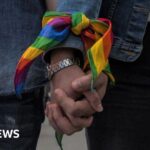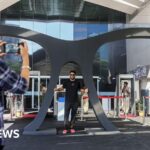BALTIMORE (RNS) — On the first public day of their November meeting, U.S. Catholic bishops spoke about the devastating impacts of the Trump administration’s immigration policies on U.S. Catholics.
The bishops, who held a series of public sessions in Baltimore on Tuesday (Nov. 11), after a day of private meetings Monday, addressed the issue of immigration and deportations during an afternoon update from the committee on migration, led by El Paso Bishop Mark Seitz, the outgoing chair of the committee.
“ This unyielding commitment to mass deportation and curtailing legal immigration, combined with the unprecedented funding for immigration enforcement that was included in the recent reconciliation bill, has created a situation unlike anything we’ve seen previously,” Seitz told the bishops in a presentation of the work his committee has been doing.
“ Our immigrant brothers and sisters, from those who are undocumented, to those who are naturalized citizens, are living in a deep state of fear,” said Seitz.
In early October, Pope Leo XIV met with Seitz and an El Paso delegation to the Vatican that included immigrants and prelates. Leo told the group “the church cannot be silent” as U.S. immigrants face a feeling of “powerlessness,” according to reporting by El Paso Matters.
Leo said he’d like to see the U.S. Conference of Catholic Bishops be more vocal against the deportations.
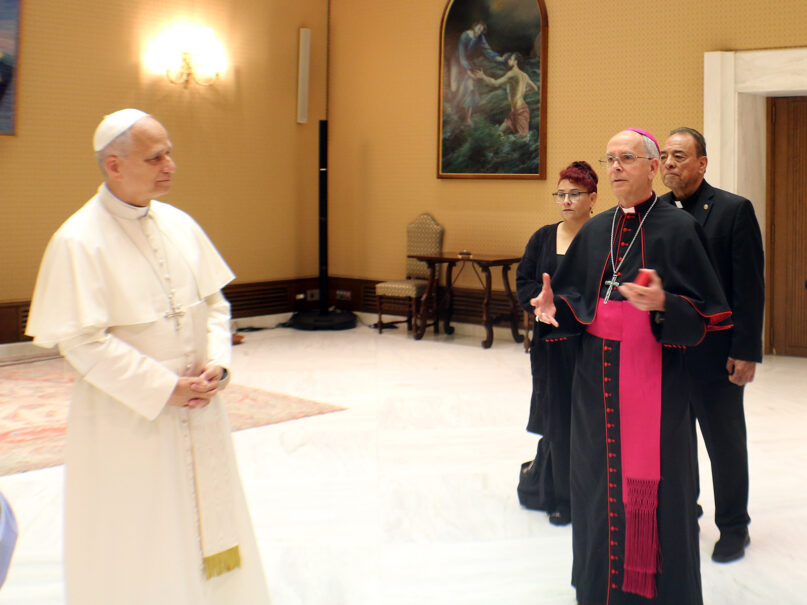
Bishop Mark Seitz, right, visits with Pope Leo XIV to deliver migrant letters from the United States on Oct. 8, 2025, at the Vatican. (Photo courtesy of Hope Border Institute)
“I wish they were stronger in their own voice,” Leo said regarding the bishops’ public stance on immigration, including outgoing conference president Archbishop Timothy Broglio of the Archdiocese for the Military Services, USA.
On the heels of Leo’s admonitions, there was a great deal of anticipation for how the bishops would approach the topic, and several conference leaders publicly lamented the impacts of the mass deportation campaign during the day’s meetings. “It should surprise no one when we defend the unborn, meet the basic needs of the immigrant, lobby for immigration reform, reach out to those in need outside our borders through (Catholic Relief Services), and call upon others to do the same,” Broglio said, addressing a room of bishops and press.
“Jesus already told us the exam questions for the final judgment,” Broglio added, insisting “there is no room for doubt and the preparation is daily.”
In June, Broglio criticized President Donald Trump’s “Big Beautiful Bill” for “promoting an enforcement-only approach to immigration and eroding access to legal protections,” but the archbishop did not call for senators to vote against it. A separate group of Catholic bishops wrote an interfaith letter urging senators to vote against the spending bill.
“Jesus identifies with the hungry, thirsty, helpless unborn, stranger, naked, homeless and prisoner. He assures us that we meet him in those others,” Broglio said Tuesday.
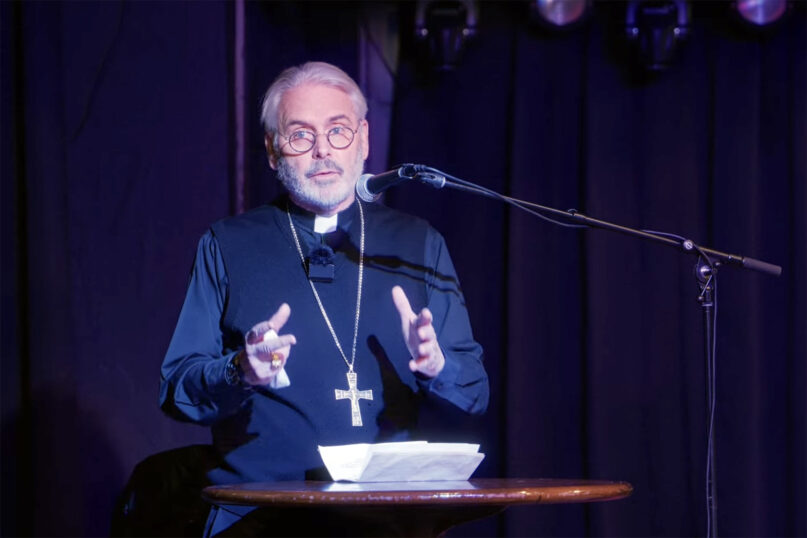
Oklahoma City Archbishop Paul Coakley speaks at an event in January 2025. (Video screen grab)
President-elect Archbishop Paul Coakley of Oklahoma City, who was elected earlier in the day Tuesday and who will take the lead for the conference after the conclusion of the meeting, was not made available for a press conference.
In a video released Tuesday evening by the USCCB, Coakley said immigration would continue to be a priority for the conference, calling it a “difficult and neuralgic topic.”
He said the conference would need to “speak clearly regarding the situation and this suffering of our people,” but he added that it’s important to cast “more light than heat” on the subject.
“We need to let our people know, not just our immigrants who are suffering in a particular way, but all of our people, that we’re accompanying them, that we are respectful of the laws of our land, but we are also responsible for the sufferings of our people,” Coakley said.
Coakley, the ecclesiastical adviser for a powerful group of conservative Catholics, has been more hawkish than other bishops in his public stance on immigration, writing in February that “illegal immigration is wrong, and renewed efforts should be considered to protect our nation’s borders.” Even so, he also acknowledged that “the majority of undocumented immigrants in Oklahoma are upstanding members of our communities and churches, not violent criminals.”
In a message the conference sent to Leo at the start of the meeting, the bishops specifically addressed U.S. deportation policies and the detainment of immigrants.
“We support secure and orderly borders and law enforcement actions in response to dangerous criminal activity, but we cannot remain silent in this challenging hour while the right to worship and the right to due process are undermined.”
The bishops intend to back up those promises with a campaign titled “You are not alone,” which Seitz discussed during his presentation. The bishops’ Justice for Immigrants website contains several suggestions for practical actions at the local level intended to provide emergency support, pastoral care and public solidarity with immigrants.
Some suggestions in the guide include creating a rapid response team to document immigration arrests, contact immigration attorneys and find standby guardians for children left behind. The guide also encourages Catholics to hold vigils and accompany families to immigration court hearings.
In a press conference, Seitz indicated that the conference expects to release a statement about immigration “that will come out of this meeting.”
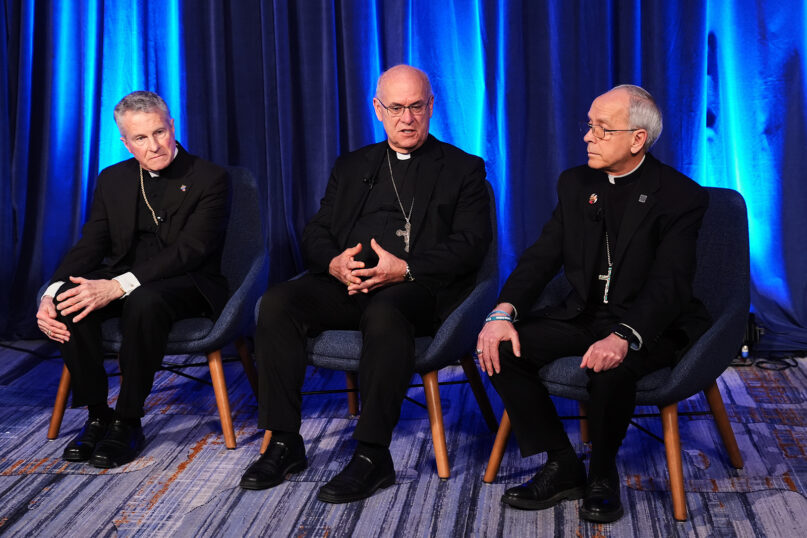
From left, Archbishop Timothy Broglio, Bishop Kevin C. Rhoades and Bishop Mark J. Seitz speak during a press conference at the United States Conference of Catholic Bishops’ plenary assembly in Baltimore, Nov. 11, 2025. (AP Photo/Stephanie Scarbrough)
Since January, Broglio has declined numerous interview requests to speak about his spiritual charge’s role in immigration enforcement. The Trump administration has deployed the National Guard to several U.S. cities to provide support for surges of federal immigration agents and, in the case of Florida’s “Alligator Alcatraz,” as security for the immigrant detention center.
Broglio told RNS Tuesday, “ It’s always a concern when our troops are engaged in domestic policing actions,” because while they are capable, that is not what they are trained to do.
He clarified that it wasn’t “an immoral act” to use the military in immigration enforcement and said he didn’t have “any direct information” about how chaplains might be supporting service members concerned about being involved in immigration enforcement.
During Seitz’s presentation to the bishops, he said the Trump administration’s rhetoric about focusing on “dangerous criminals” has been contradicted by the detention of immigrants at their court hearings, the targeting of international students and changes to protections for unaccompanied minors.
“ Over two-thirds of the almost 60,000 people held in immigration detention at the end of September had no criminal convictions,” said Seitz.
Seitz also referenced the administration’s removal of legal status for “hundreds of thousands of people” and the decision to set the number of admitted refugees to the “lowest limit in the 45-year history of the program.”
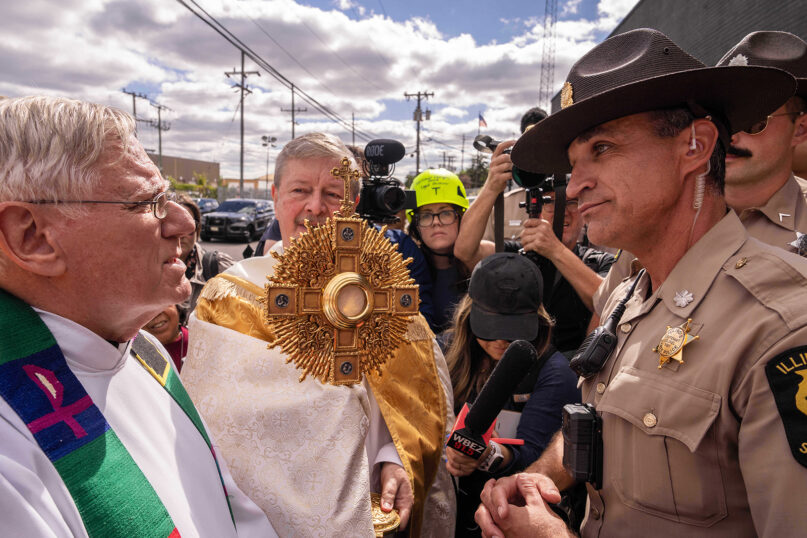
A member of the Illinois State Police, right, relays the message to clergy that U.S. Immigration and Customs Enforcement denied them access to detainees to provide them Communion, outside an ICE facility in Broadview, Ill., Oct. 11, 2025. (AP Photo/Adam Gray)
In a press conference, Bishop Kevin Rhoades of Fort Wayne-South Bend, Indiana, chair of the conference’s religious liberty committee, said that sacramental access for Catholics in immigration detention had become a key issue for the committee.
“Our focus in the committee on religious liberty was basically the church’s right to provide charitable services for immigrants,” said Rhoades. “We didn’t really anticipate what we’re facing now with the detention centers.”
Outside Broadview, a detention center outside Chicago, where Trump has focused a recent deportation campaign, Catholic clergy and other faith leaders have been arrested and hit with pepper balls during vigils and protests. Additionally, they have been denied access to offer the Eucharist to detainees. The conference has also faced right-wing accusations that the church’s charity work with migrants was fueling “illegal immigration,” which escalated in Texas to investigations by Attorney General Ken Paxton.
Rhoades said it was “heartbreaking” to think about the suffering of the detained immigrants separated from their families. “ They need spiritual support at this time, and they need the sacraments,” he said.
The bishop said that the sacramental access issue had been discussed by the religious liberty committee on Monday. Rhoades is on the advisory board for the Trump administration’s religious liberty commission and said he had been unable to express concerns through that channel due to the government shutdown, but that he expected the administration was aware of the bishops’ concerns through news reports.
Ahead of the conference, Faithful America, an online Christian social justice group, said it would be hiring a mobile billboard to circle the bishops’ hotel to call on them to put out “a strong statement against ICE and Trump’s immigration policies,” as well as delivering a petition from 16,000 Catholics and ecumenical allies with the same message. (RNS did not observe the mobile billboard while entering or exiting the hotel.)
Another activist group, Christians for a Free Palestine, gathered Tuesday evening outside the conference to protest the bishops’ “failure to publicly condemn the ongoing siege and bombardment of Gaza,” which they said “stands in stark contrast to Catholic social teaching.”
During his speech, Broglio encouraged bishops and other listeners to push for greater contributions to the annual collection for the Holy Land. “The need there is extreme and the war in Gaza has only exacerbated the suffering for the dwindling Christian population in the land where Jesus walked.”
Broglio said the Franciscan guardian of the Holy Land had reported that “several hundred families have left their homes in Bethlehem alone, due to the feelings of hopelessness.”
In another advocacy effort, Catholics for Choice, a Catholic reproductive rights group, announced it had paid for a billboard outside the conference that would emphasize that “Mary had a choice” in saying yes to carrying Jesus in pregnancy.
The bishops plan to vote Wednesday to approve new Ethical and Religious Directives for Catholic Health Care Services, which already contain prohibitions on abortions, and add language restricting gender-affirming care for transgender people.


